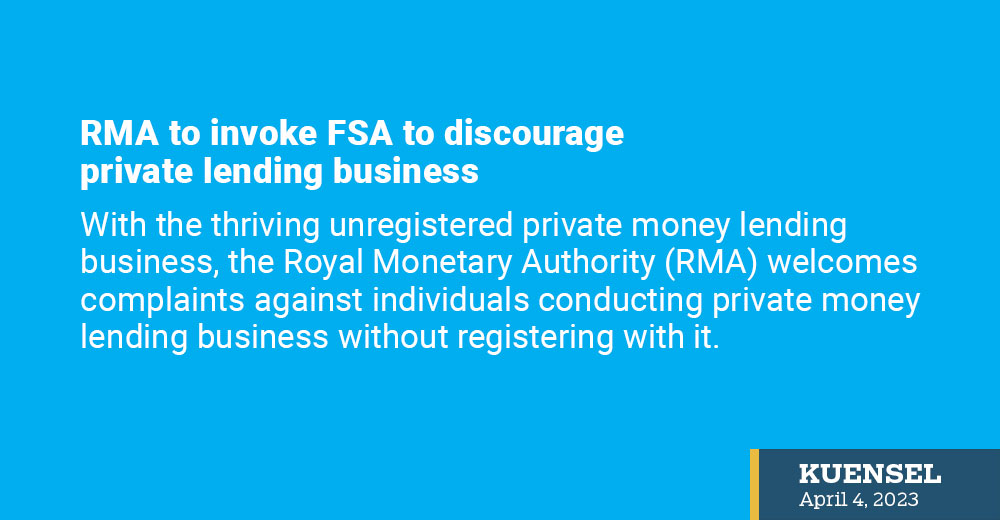Rinzin Wangchuk
With the thriving unregistered private money lending business, the Royal Monetary Authority (RMA) welcomes complaints against individuals conducting private money lending business without registering with it.
To handle such complaints, according to RMA’s Legal Chief Pemba Thinley, the RMA has a dedicated consumer protection unit (CPU). He said that although RMA is empowered to regulate and supervise only registered private money lending businesses, the RMA will pursue the unregistered money lenders based on complaints.
“RMA will entertain complaints against any individual or loan shark engaged in illegal money lending business,” Pemba Thinley said. “This is also in line with the Rules and Regulations for Registered Private Money Lenders (RRRPML) 2023 adopted by the authority for effective implementation of the Act.”
The fourth edition of rules, which came into force on March 1, 2023, also repealed the rules and regulations 2021. It was adopted to minimize threats to the financial system and enhance the effectiveness of money, and minimise adverse socio-economic consequences arising from private money-lending businesses.
Henceforth, the complainant can submit his or her complaint in writing with the particulars of the incident such as date, time, place, identities of the parties involved and a copy of the relevant document. “Such details are required for the customer complaint handling unit (CCHU) to ascertain whether it merits investigation or not,” the legal chief said.
He said that upon completion of the review by the CPU, after enough grounds are established, the case will be forwarded to the Office of Attorney General (OAG) in accordance with the Section 166 of Financial Services Act (FSA) 2011 for prosecution.
The FSA’s Section 11 does not allow any person to offer financial services without obtaining the registration certificate or licence.
An unregistered private money lender who knowingly engages in money-lending business shall be guilty of an offence as per Section 15 of the FSA. The section states that without a license required under this Act in an activity for which such is required, commits an offence and on conviction shall be fined the minimum wage at the time of the crime for a period extending from 15 to 30 years and liable for misdemeanour.
The Supreme Court (SC) earlier this year invoked FSA 2011 for the first time penalising both the lender and borrower in a private money lending case involving Nu 1.2M. The court overruled the lower court’s judgments and imposed hefty fines after establishing the agreement between the parties drawn on the pretext of the land transaction was actually for private money-lending. The lender was found guilty of providing a private loan without a licence and seized the principal amount. The court ordered the principal amount to be deposited into the government coffer.
“When it comes to illegal private money-lending, we feel that the courts could prevent such lending cases from escalating,” an official from RMA said, adding that the central bank can regulate only registered money lenders.
One of the female victims said that there are more than 10 women loan sharks in Thimphu – from Babesa to Chuniding to Serbithang, Olakha, Changzamtog, Hongkong Market and above the Centenary Farmers Market area.
Kuensel also learnt that a woman loan shark who operates business in Hongkong market allegedly funded the recent gold smuggling case. Three men were arrested along with more than seven kilograms of gold after they exited from Paro International Airport terminal on March 22.
Who can be private money lenders?
A person intending to engage in private money-lending business should obtain a registration certificate from the Authority. While applying for registration certificate, the person should declare the source of income along with bank statement and tax returns for the past two years issued by the Department of Revenue and Customs and other relevant documents. However, an applicant shall not be allowed to borrow from the financial service providers for private lending business.
An applicant after obtaining a registration certificate from the authority shall apply for a trade licence to the Department of Trade, MoENR and upon receipt of a trade licence, an applicant shall submit a copy of the same to the RMA.
According to RRRPML, a registered private money-lender can commence its operation only upon submission of a copy of trade licence to the Authority. The validity of registration certificate is for one year. Application to renew the registration certificate along with the renewal fee of Nu 1,000 should be submitted 30 days before the expiry of the current certificate.
If a registered private money-lender fails to renew the registration certificate before the expiry date of the current registration certificate, the same shall be automatically cancelled. Any lending carried out between the period after the expiry of the registration certificate and before obtaining the approval for renewal of the registration certificate will be construed as illegal.
Initially, four private money-lenders were registered with RMA but two did not renew and left with only two lenders in the market today.
With effect from March this year, RMA also revised lender’s interest rate from 12 percent to 18 percent per annum. Pemba Thinley said that the interest rate capped at 18 percent does not mean the registered private money lender should also charge the highest ceiling of interest rate. “They could charge any interest rate between 12 percent and 18 percent,” he said.
However, there is no change in maximum loan amount of Nu 500,000 the registered money lender can provide to a single borrower. The minimum amount is Nu 90,000.


